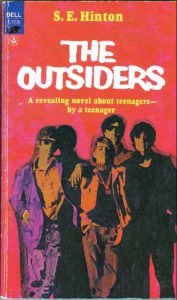
14-year-old orphan Ponyboy Curtis lives with his older brothers Darry and Sodapop in a city somewhere in America. They are part of a greaser gang which means they smoke, they fight, they swear. The author was only 16 when her novel The Outsiders hit the bookshelves and disturbed America’s sense of decency. Afterwards, Susan Eloise Hinton’s life was never the same, and the attentive reader might wonder if the opponents of The Outsiders feared something more than improper manners.
In the 1950s and 60s, Greasers were named for their wild greasy hairstyles, but the term does not just refer to fashion. Hinton shows us that greasers are on the low end of the social scale, either small-time criminals or – as is the case with Ponyboy’s brothers – breaking their backs with honest work, yet still making little money. On the other end, there are the Socs, short for Socials, the rich kids, born with a silver spoon in their mouth who live in the good part of town and wear fancy clothes.
Susan Eloise Hinton is both celebrated and damned, receives prizes and angry letters alike. Her work is placed on the syllabi of some schools and banned completely from others. Even three decades later, The Outsiders ranks 43rd on the ALA’s list of the “100 most frequently challenged books 1990 – 2000.” Vulgarity, violence, and drug-abuse are the most numerously stated reasons for concern, in short, the fear that the novel’s young characters might be a bad influence on the novel’s young readers. In his podcast, Banned Library, ST Harker comments on the controversial nature of The Outsiders.
Granted, cigarettes are omnipresent in Ponyboy’s gang, and violent conflict with the Socs appears to be daily business. Also, they certainly don’t talk like Harvard graduates. But is it possible that expressions like “shoot” and “golly” led to a novel being denounced as “vulgar”? Most importantly: The Greasers’ lifestyle is not glorified. So, what was the all the fuss about?
In 1931, the American historian James Truslow Adams wrote “a dream of social order in which each man and each woman shall be able to attain to the fullest stature of which they are innately capable, and be recognized by others for what they are, regardless of the fortuitous circumstances of their birth.” With these words, he coined the slogan of the American Dream, which since then has developed into a powerful symbol of America’s greatness. 76 years later, then-soon-to-be President Barack Obama proclaimed in a speech “that through hard work and sacrifice each of us can pursue our individual dreams, but still come together as one American family.”
Hinton’s novel and those quotes make it obvious that Ponyboy and his Greaser friends are not part of that dream. The Socs kids, however, who have it all look down on those who have nothing – along with the rest of society. There is no sign of “one American family” in the book, only class conflict and social inequality. Ponyboy’s vision near the end of the novel, a world “without greasers or Socs, with just people” can be considered Hinton’s social statement in literary form. This antithesis to the American Dream was likely viewed as a threat to the minds of young Americans during the heated times of the Cold War. So maybe the whole ado wasn’t truly about “golly,” but more about “commie.”
I do not mean to lift a finger or even take sides here: The idea of the American Dream is a complex cultural topic with a long history, not a simple “yay or nay” question. So are the fears and feelings during the Cold War era. Nevertheless, The Outsiders is a quick, simple, and a worthwhile read, and maybe looking at conflicts from the past can help us learn for the present. In 2017, S.E. Hinton talks about the lasting success of her novel in this interview:
https://www.youtube.com/watch?v=JvQ4GIYihzg
48,983 Total Views, 6 Views Today






